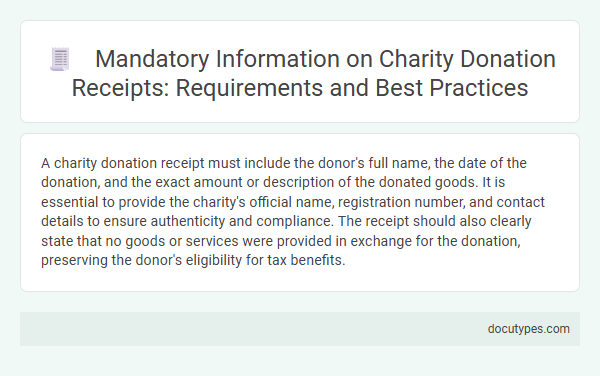A charity donation receipt must include the donor's full name, the date of the donation, and the exact amount or description of the donated goods. It is essential to provide the charity's official name, registration number, and contact details to ensure authenticity and compliance. The receipt should also clearly state that no goods or services were provided in exchange for the donation, preserving the donor's eligibility for tax benefits.
Introduction to Charity Donation Receipts
Charity donation receipts serve as official proof of contributions made to nonprofit organizations. These receipts are essential for tax deduction claims and donor records.
- Donor Information - The receipt must include the full name and address of the donor to verify their identity.
- Donation Details - It should specify the date, amount, and nature of the donation, whether monetary or in-kind.
- Charity Identification - The receipt must display the charity's official name, registration number, and contact information for authenticity.
Legal Requirements for Donation Receipts
Charity donation receipts must comply with strict legal requirements to ensure donor eligibility for tax deductions. These requirements provide transparency and accountability for both donors and charitable organizations.
- Donor Information - The receipt must include the full name and address of the donor as proof of identity.
- Charity Details - The official name and registration number of the charitable organization must be clearly stated.
- Donation Amount and Date - The exact value of the donation along with the date it was received are mandatory for tax validation.
Receipts that omit any required information may not be recognized for tax deduction purposes under charity law.
Essential Information for Compliance
| Essential Information for Compliance | Description |
|---|---|
| Charity Name and Registration Number | The official name of the charitable organization and its valid registration or tax-exempt number must be clearly stated to verify legitimacy and compliance. |
| Date of Donation | The exact date when the donation was received is required to track the transaction for both donor and charity records. |
| Donor's Name | Your full name or the name of the individual/entity making the donation must appear on the receipt to confirm the donor's identity. |
| Donation Amount or Description of Goods | The monetary value of the donation or a detailed description and estimated value of non-cash contributions must be included for accurate tax reporting. |
| Statement of No Goods or Services Received | If applicable, a declaration that no goods or services were provided in exchange for the donation is necessary to qualify for tax deductions. |
| Charity Contact Information | Contact details such as address, phone number, or email must be present to enable verification or any follow-up communication. |
| Authorized Signature | An authorized representative of the charity should sign the receipt, validating the information and ensuring authenticity. |
Donor Identification Details
A charity donation receipt must include clear donor identification details to ensure accurate record-keeping and tax deduction claims. Your full name and contact information are essential components for verifying the source of the donation. Including these details on the receipt provides proof of your contribution and supports compliance with legal requirements.
Organization Identification Details
What Organization Identification Details Are Mandatory on a Charity Donation Receipt?
A charity donation receipt must include the official name of the registered charity as recognized by the relevant tax authority. It should also contain the charity's registration or tax identification number to verify its legitimacy.
Description and Value of Donation
Charity donation receipts must clearly include a detailed description of the donated items or services to ensure transparency and proper record-keeping. The value of the donation, whether monetary or estimated for in-kind gifts, is essential for tax deduction purposes and donor acknowledgment.
The description should specify the type, quantity, and condition of donated goods or the nature of the services provided. Accurately stating the donation's value helps donors claim appropriate tax benefits and supports the charity's audit compliance. In cases of non-cash donations, receipts often require an estimated fair market value determined by recognized appraisal methods or official guidelines.
Date and Nature of Contribution
A charity donation receipt must clearly state the date when the donation was made to validate the timing for tax purposes. The nature of the contribution, whether monetary or in-kind, should be explicitly described to ensure accurate records. Your receipt serves as official documentation for your charitable giving and tax deduction claims.
Disclosure of Goods or Services Provided
A charity donation receipt must clearly disclose any goods or services provided in exchange for the donation. This information ensures transparency and helps donors understand the full value of their contribution.
If your donation included gifts or benefits, the receipt should state their fair market value. Accurate disclosure allows proper tax deduction claims and maintains trust between the charity and its supporters.
Electronic vs. Paper Receipts: Acceptable Formats
Charity donation receipts must include specific details such as the donor's name, the donation amount, the date of the contribution, and the charity's registration number. These elements ensure the receipt meets legal requirements for tax deduction purposes.
Electronic receipts are widely accepted and can be issued in formats like PDF or digital images, provided they contain all mandatory information. Paper receipts remain valid and should be printed on official letterhead or contain the charity's official stamp to verify authenticity.
What Information Is Mandatory on a Charity Donation Receipt? Infographic

